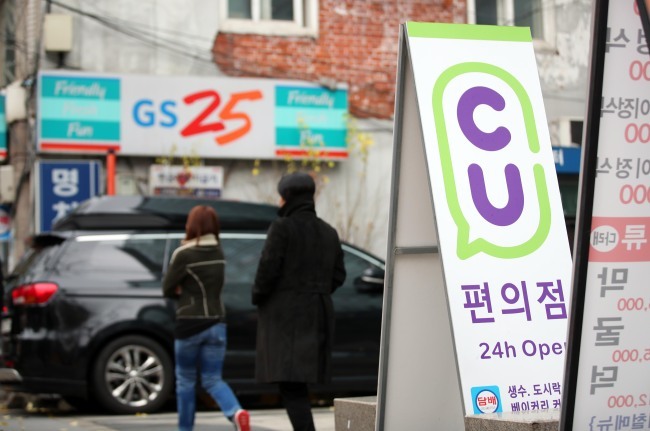Approximately 48 percent of franchisees of major convenience store chains here such as CU, GS25 and 7-Eleven suffered deficits last year amid severe market saturation, a lawmaker said Tuesday, citing industry data.
Based on convenience store association data, disclosed by Rep. Woo Won-shik from the ruling Democratic Party, 47.8 percent or 15,819 of the country’s total 33,068 convenience stores as of last year reported sales of less than 1.5 million won ($1,255) per day.
Among them, 20 percent or 6,646 stores reported daily sales of less than 1.1 million won. Around 7 percent earned less than 800,000 won per day.

(Yonhap)
By convenience store chain, 7-Eleven showed the highest number of stores reporting deficits, at 69 percent. About 39 percent of 7-Eleven stores reported less than 800,000 won in daily sales.
CU, operated by BGF Retail, had 48 percent of stores reporting less than 1.5 million won in sales per day, while the corresponding figure for GS25 was 33 percent.
According to industry data, the number of convenience stores rose from some 12,000 in 2008 to some 45,000 as of the first half of this year, driven by an increase in single-member households as well as diversified categories of products sold 24/7.
While the combined annual sales of convenience store chains’ headquarters went up by three times to some 14 trillion won last year from 4.8 trillion won in 2007, average annual sales of convenience store franchisees stood at 470 million won, down from 503 million won.
Industry insiders said the headquarters could have “recklessly” increased the number of stores, leading to reduced sales for franchisees.
Meanwhile, franchisee owners say the government needs to come up with measures such as setting the minimum distance between stores, to quell excessive competition.
“The government should more actively engage and apply regulations like obligating the minimum distance between rival stores, considering the area and the floating population,” said Choi Jong-yeol, head of the CU franchisees association.
Last year, the Fair Trade Commission approved a set of voluntary rules agreed to by convenience store operators, such as limiting the opening of convenience stores to 50-100 meters away from each other, in an effort to ease market saturation.
It was the first time convenience stores had set the minimum distance since 2000, when a similar restriction of 80 meters was abolished out of concerns of collusion.
“What always becomes problematic in the field of franchises is the opening of stores. From the company’s point of view, it is necessary to open more stores, but it should also be able to understand and protect franchisee’s business environment when there is market saturation,” said Cho Jae-woon, a professor of business from Aju University.
By Kim Da-sol (ddd@heraldcorp.com)






![[Graphic News] More Koreans say they plan long-distance trips this year](http://res.heraldm.com/phpwas/restmb_idxmake.php?idx=645&simg=/content/image/2024/04/17/20240417050828_0.gif&u=)